- Home
- Patricia Briggs
Raven's Shadow rd-1 Page 5
Raven's Shadow rd-1 Read online
Page 5
One of the men had been a soldier in his youth, and Tier spent a little time exchanging stories. The innkeeper, noticing that there was a newcomer, offered Tier ale. He took it, but merely nursed it because the oblivion he sought wouldn’t come from alcohol.
Ciro gradually shifted from playing broken bits and pieces into a recognizable song, and an old, toothless man began humming, his tone uncertain with age, but his pitch absolutely true. One after the other the old men began to sing. Tier joined in and let the healing music make the present fade away.
They sang song after song, sometimes pausing while one man tried to hum enough of something he’d heard long ago for Ciro to remember it, too—that man had a memory for music that Tier had only seen his grandfather equal.
It was the first time that he was happy to be home.
“Boy,” said Ciro, “sing ‘The Hills of Home’ with me.”
Tier grinned at the familiar appellation. It no longer fit as well as it had when he’d tagged along after his grandfather. He stood and let the first few notes of the viol pull him into the song. He took the low part of the duet, the part that had been his grandfather’s, while the old man’s warm tenor flung itself into the more difficult melody. Singing a duet rather than blending with a group, Tier loosed the power of his voice and realized with momentary surprise that Ciro didn’t have to hold back. For the first time, Tier’s singing held its own with the old musician’s. Then the old words left no more room for thought. It was one of the magic times, when no note could possibly go astray and any foray into countermelody or harmony worked perfectly. When they finished the last note they were greeted with a respectful silence.
“In all my wandering, I’ve never heard the like. Not even in the palace of the Emperor himself.” A stranger’s voice broke the silence.
Tier turned to see a man of about fifty, a well-preserved, athletic fifty, wearing plain-colored clothes of a cut and fit that would have done for a wealthy merchant or lower nobleman, but somehow didn’t seem out of place in a rural tavern full of brightly dressed Rederni. His iron-grey hair, a shade darker than his short beard, was tied behind his head in a fashion that belonged to the western seaboard.
He smiled warmly at Tier. “I’ve heard a great deal about you from these rascals since you returned—and they didn’t lie when they said that your song was a rare treat. Willon, retired Master Trader, at your service. You can be no one but Tieragan Baker back from war.” He held his hand out, and Tier took it, liking the man immediately.
As Tier sat down again, the retired master trader pulled a chair in between two of the others so he sat opposite Tier at the table.
Ciro smiled and said in his shy speaking voice, so at odds with his singing, “Master Willon has built a fine little store near the end of the road. You should go there and see it, full of bits and things he’s collected.”
“You are young to be retiring,” observed Tier. “And Redern is an odd place to choose for retirement—these mountains get cold in the winter.”
Master Willon had one of those faces that appeared to be smiling even in repose—which robbed his grin of not a bit of its effect.
“My son made Master last year,” he said. “He’s got a fire that will take him far—but not if he spends all of his days competing with me for control of the business. So I retired.”
Willon laughed quietly and shook his head. “But it wasn’t as easy as that. The men who serve my house had been mine for thirty years. They’d listen to my son, nod their heads, and come to me to see if I liked their orders. So I had to take myself out of Taela, and Redern came to mind.”
He raised his tankard to Ciro. “My first trip as a caravan master I came by this very inn and was treated to the rarest entertainment I’d ever heard—two men who sang as if the gods themselves were their audience. I thought I’d heard the finest musicians in the world in Taela’s courts, but I’d never heard anything like that. Business is business, gentlemen. But music is in my soul—if not my voice.”
“If it’s music you like, there’s plenty here,” said Tier agreeably as a small group of younger men came through the inn door.
“Well look what decided to drop by at last,” said one of them. “You wiggle out from under your sister’s thumb, Tier?”
Tier had greeted them all since he’d returned from war, of course, but that had been under different circumstances, when they were customers or he was. The tavern doors made them all kindred.
Too much so.
With the younger men came less music and more talk—and they must have been talking to his mother because most of the talk had to do with his upcoming marriage. The question was not when he was going to marry; it was to whom.
Tier excused himself earlier than he had expected to and found himself leaving with Master Willon.
“Don’t let them fret you,” Willon said.
“I won’t,” Tier said. He almost stopped there, but couldn’t quite halt his bitterness—maybe because a stranger might understand better than any of his friends and kin he’d left behind in the tavern. “There’s more to life than wedding and breeding and baking bread.”
He started walking and Willon fell into step beside him. “I’ve heard as much praise for your baking as I have for your singing. You don’t want to be a baker?”
“Baking…” Tier struggled to put a finger on the thing that bothered him about his family’s business. “Baking is like washing—the results are equally temporary.” He gave a half-laugh. “That’s arrogant of me, isn’t it? That I’d like to do something that means more, something that will outlast me the way these buildings have outlasted the men who built them.”
“I hadn’t thought of it that way before,” said Willon slowly. “But immortality… I think that’s a basic instinct rather than the product of pride. It goes toward the same things that they were trying to push you into. How did you put it? Wedding and breeding. A man’s immortality can be found in his children.”
Children? Tier hadn’t been aware that he’d thought about the matter at all, but the need was there, buried beneath the “I can’t breathe with the weight of my family’s wishes” tightness in his chest.
“So what do you want to do, if not bake?” asked Willon, betraying his foreignness with the question. No Rederni would have suggested that he do anything else. “Would you go back to fighting if there were a war to be had?”
“Not soldiering,” Tier said firmly. “I’ve killed more than any man ought—the only product of warmaking is death.” Tier took a deep breath and closed his eyes briefly as he thought. Maybe it was seeing his little valley again on his morning ride, but something inside of him vibrated like one of Ciro’s viol strings when he finally said, “I’d like to farm.”
Willon laughed, but it was a comforting laugh. “I’d not think that growing crops would be much more permanent than baking bread—just takes a bit longer to get to the final product.”
But it wasn’t. It was different. Tier stopped walking so that he could encompass that difference in words that didn’t sound as stupid out loud as they did to himself, stupid but true.
“I’ve known farmers,” he said slowly. “A lot of the men who fought the Fahlarn were farmers, fighting for their lands. They are as much a part of their lands as flour is a part of bread.” He shook his head at himself and grinned sheepishly because it sounded stupider out loud. “The land is immortal, Master Willon, and a farmer has a part of that immortality.”
“So are you going to be a farmer?” asked Willon with interest.
“And marry and breed?” Tier said lightly over the longing Willon’s words produced. “Not likely.” He began walking again, though they’d passed the bakery a while back. He had no desire to go home yet. “There’s not a woman in Redern who’d marry me and let me go farming. I know the money farming brings in and that bakery brings in ten times as much—and it would break my family’s heart.”
“Farmers don’t make much,” agreed the master trader. “But
if you look around you might find a woman who’d rather be a farmer’s wife than live in the village under the tyranny of her neighbors.”
That night Seraph got up out of her cot in the small room they’d given her and climbed out of the window into the garden that backed the house, her blanket serving as a cloak. The solid walls made her feel closed in and trapped. Most of her nights had been spent in tents rather than buildings.
She found the bench that had served as her bed on more than one night since she’d chosen to stay here and lay down on it again to look up at the stars.
She needed to go. These people owed her nothing, not the food she ate or the blanket she wrapped herself in. She did not belong here. She hadn’t heard the argument that Tier and Alinath had while she swept the front room, but she’d heard the raised voices.
Tomorrow, she would go. In two weeks or three she would find a clan that would take her in.
Resolute, she closed her eyes and willed herself to sleep. A long time later, exhaustion had more success than her will and she relaxed into slumber.
A rotten tomato hit Arvage’s shoulder while the solsenti boys bounced with nervous bravado. Didn’t they know that the old man could kill them all with a touch of the magic he knew? Didn’t they know that he and Seraph had spent the better part of the past two days banishing a khurlogh, a demon spirit, that had been preying on nighttime visitors to the town well?
Instead her teacher’s arthritic fingers touched the mess on his shoulder and transformed it into a fresh, ripe tomato.
“My thanks, young sirs,” he said. “A rare addition to my dinner.”
The scene faded as Seraph stirred restlessly in protest of the old memory. She quieted and her dream took up again at a different point in time.
Her father’s fingers petted her hair as she leaned against his knee, half-asleep in the aftermath of a full meal and the warmth of the nearby fire.
“The entire clan gone?” her father said, a small tremor in his bassy voice. “Are you certain it was the Imperial Army?”
Their visitor nodded his head wearily. “As far as we’ve been able to determine, the last village that they passed through complained to the commander of the imperial troops stationed nearby. Told them that the Travelers kidnapped a pair of young women. The troops came upon the clan and massacred them from grandfather to day-old babe. Turns out that the women were taken by bandits—the imperial troops found them on their way back to the village.”
They buried Arvage in a wilderness glen, just as he had wanted. Seraph herself had thrown in the first, symbolic, handful of earth. He’d died trying to work magic that he could no longer harness because the pain in his joints broke through his fearsome control. He’d known the risk.
In one of those things possible only in dreams, Arvage stood beside her while her father and brothers buried him.
“It is our task to take care of them or die,” he told her. “Our purpose is to keep the shadows at bay for the solsenti who are helpless against them. This is a Raven’s task before us, and I am Raven—as are you. You aren’t old enough and I am too old, but we do as we must.”
Tier hadn’t lived in the comfortable safety of the village long enough to sleep through small noises in the night. He’d heard Seraph go out, as she often did, and he’d gone back to sleep afterward. But he’d awakened again.
He waited for the noise to repeat itself, and when it did he pulled on his pants and slipped out his window to the garden where Seraph whimpered in the helpless throes of a nightmare.
The man was from the Clan of Gilarmist the Fat, running a message to another clan. He’d flirted with Seraph’s oldest sister and died in the night. Her sister died the next morning, drowning in the fluid that they couldn’t keep from filling her lungs.
By the time four days had passed only Seraph and her brother Ushireh were left to bury the dead. Ushireh worked until he passed out. She’d been so afraid that he was dead, too; it had taken her a long time to convince herself that he was only unconscious. She’d dragged him away from the dead they’d gathered together in the center of the camp, then she’d burned it all—camp and bodies alike. It had been weeks before she could work enough magic to light a fire.
When she managed it at last, Ushireh’s body sat up in the pyre, and his head turned until he could fix his glowing eyes on her. Seraph shrank back and tried to close her eyes. As if in death he’d acquired the magic he’d so envied her in life, his will kept her from looking away from him.
“You left me,” he said. “You left your duty. You cannot run forever, Seraph, Raven of the Clan of Isolda the Silent.”
She awoke with a gasp and a cry and was gathered into warm arms and rocked gently.
“Shh,” said Tier, “it was a dream. You’re safe.”
She buried her head in his shoulder and gave up a lifetime of self-control to sob raggedly against him. “I can’t do it,” she said. “I don’t want to be a Traveler. They all die, and I have to burn them and bury them. I’m so tired of death and duty. I want… I want…” What she wanted was tied away from her in strands of guilt and duty, but she found a fair approximation of it in the safety of Tier’s arms.
“Shh,” he said. “You don’t have to go if you don’t want to.”
His words passed over and around her, the sense lost to her grief and guilt, but the sound of his voice comforted her.
From the third of the three windows that looked out into the garden, Alinath watched her brother hold the witch he’d brought home and she clenched her fists before she turned away.
When the worst of it had passed, embarrassment made Seraph turn away and wipe her face with the corner of the blanket.
“Sorry,” she muttered. “It was a nightmare.”
“Ah,” said Tier as he let her pull away from him. “It sounded worse than that to me.”
She shrugged, not looking at him. “Memories make the worst nightmares, my father always said.”
“You don’t have to go find another clan,” he said. “You can stay here.”
She tried to stifle her involuntary laugh. It wouldn’t be polite to disparage the hospitality of his family. “No, I can’t. Thank you. But no.”
“I can’t leave now,” said Tier. “But I fear it won’t be long. Mother complains and frets until it’s hard to believe that she’s sick at all—but she’s losing weight and her color is much worse. Can you wait?”
Seraph held herself still. Could she wait to take up her duties? Oh, yes. Wait forever if she could. But was it the right thing to do?
At last she nodded. “I’ll wait.”
“Good.”
Tier sat with her a bit, while the sweat dried on her back. With the air of a man coming to a decision, he took something from around his neck and put it into her hands.
“This came with me into war and kept me safe enough through any number of battlefields. As I am unlikely to need it now, I’d like you to take it.”
She fingered the collection of large wooden beads carefully.
“They’re not much to look at,” he said hastily, and with a little embarrassment, she thought. “But they carry the blessing of our priest. You’ve met Karadoc?”
She nodded. The priest had sought her out to give her his sympathies on the death of her brother. The only Rederni aside from Tier who had. She hadn’t been quite sure how to deal with a priest—Travelers had little use for the minions of the gods—but he’d seemed like a good person.
“Karadoc gave me that for helping him tend his garden after he broke his wrist one summer.”
“It must have been more than that,” Seraph said thoughtfully. “People don’t give gifts like this lightly.”
He stiffened, “It’s just a bunch of wooden beads, Seraph.”
She put them against her face and rubbed against them like a cat, soaking in the warmth that emanated from the battered wood. “Old wooden beads,” she said. “I can’t tell exactly how old, but they’ve been given in love and worn that way for a l
ong, long time. They comfort me—did they comfort you while you were far from your home?” She didn’t wait for his answer, “Tell me the story of your gardening for Karadoc?”
“I was young,” he said finally. “Karadoc is… well, you’ve met him. He always took time to talk to me, listening to me when my father and I fought.”
His voice hadn’t fallen into the cadences of storytelling; he told this story hesitantly. “Karadoc broke his wrist; I told you that. His garden is his pride and joy, and it started to get overgrown almost immediately. I suppose being the priest of the god of green and growing things has a certain influence on your garden.”
“He hired a boy to tend it, but when harvest season came the boy had to help his father in the field, and Karadoc couldn’t find another one. So I started getting up a little earlier in the morning so I could work on it a bit.”
Seraph smiled a little; the beads and Tier’s company had worked their own magic. “He didn’t know you were doing it.”
“Well, I wasn’t certain that I would do it more than once or twice. A baker gets up early to miss cooking in the heat of the day. I didn’t want to promise something I couldn’t do.”
“And Karadoc found you out,” said Seraph. “When you wouldn’t take any pay, he gave you these.”
He nodded.
Seraph put the necklace around her throat. Gifts could not be returned, only appreciated. She would find something she could do to repay him for his kindness to her and his gift. A Traveler’s blessing could be a useful thing.
“Thank you for this,” she said. “I will treasure it as long as it remains in my hands and pass it on as you have, as Karadoc did.”
They lapsed into a comfortable silence.
“A man asked me today what I’d do if I could do something besides baking and soldiering,” he said at last.
“What did you answer?”
“Farming,” he said.
She nodded. “The land gives back everything you put into it and a little more, if you have the knack.”
“If you could do anything, be anything, what would it be?”

 Wolfsbane
Wolfsbane When Demons Walk
When Demons Walk Cry Wolf
Cry Wolf On the Prowl
On the Prowl Iron Kissed
Iron Kissed Hunting Ground
Hunting Ground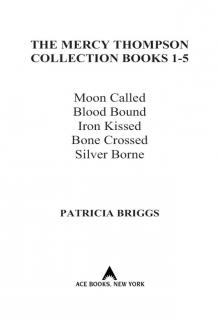 Patricia Briggs Mercy Thompson: Hopcross Jilly
Patricia Briggs Mercy Thompson: Hopcross Jilly Burn Bright
Burn Bright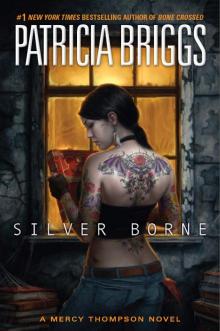 Silver Borne
Silver Borne Storm Cursed
Storm Cursed Shifting Shadows
Shifting Shadows Frost Burned
Frost Burned River Marked
River Marked Silence Fallen
Silence Fallen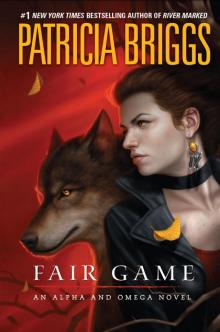 Fair Game
Fair Game Moon Called
Moon Called Fire Touched
Fire Touched Dead Heat
Dead Heat Blood Bound
Blood Bound Dragon Bones
Dragon Bones Night Broken
Night Broken The Hobs Bargain
The Hobs Bargain Ravens Shadow
Ravens Shadow Ravens Strike
Ravens Strike Storm Cursed (A Mercy Thompson Novel)
Storm Cursed (A Mercy Thompson Novel) Bone Crossed
Bone Crossed Dragon Blood
Dragon Blood Smoke Bitten: Mercy Thompson: Book 12
Smoke Bitten: Mercy Thompson: Book 12 Smoke Bitten
Smoke Bitten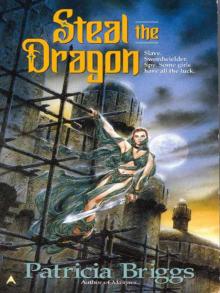 Steal the Dragon
Steal the Dragon 0.5 On The Prowl (alpha and omega)
0.5 On The Prowl (alpha and omega) Alpha and Omega
Alpha and Omega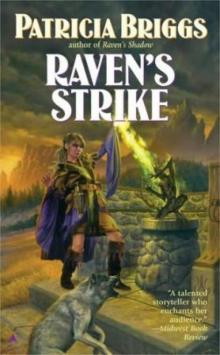 Raven's Strike rd-2
Raven's Strike rd-2![[Mercy 03] - Iron Kissed Read online](http://i1.bookreadfree.com/i/03/24/mercy_03_-_iron_kissed_preview.jpg) [Mercy 03] - Iron Kissed
[Mercy 03] - Iron Kissed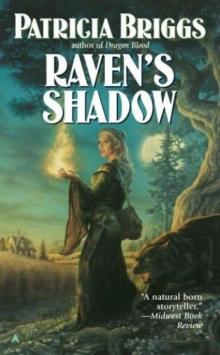 Raven's Shadow rd-1
Raven's Shadow rd-1 Frost Burned mt-7
Frost Burned mt-7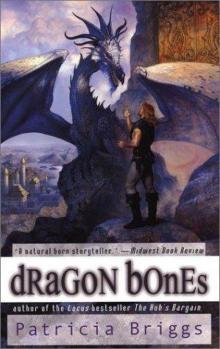 Dragon Bones h-1
Dragon Bones h-1 Shifting Shadows: Stories from the World of Mercy Thompson
Shifting Shadows: Stories from the World of Mercy Thompson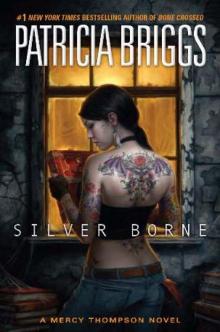 Silver Borne mt-5
Silver Borne mt-5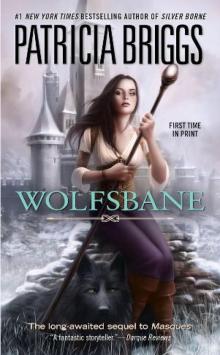 Wolfsbane s-2
Wolfsbane s-2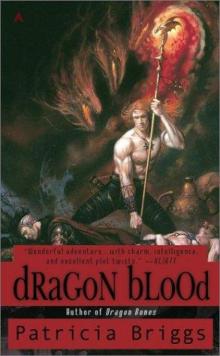 Dragon Blood h-2
Dragon Blood h-2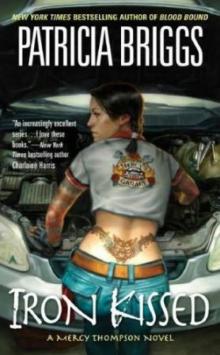 Iron Kissed mt-3
Iron Kissed mt-3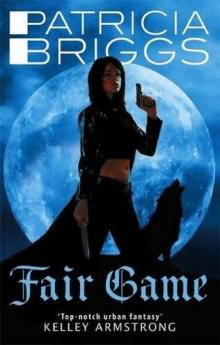 Fair Game aao-3
Fair Game aao-3 Masques s-1
Masques s-1![[Hurog 01] - Dragon Bones Read online](http://i1.bookreadfree.com/i1/04/03/hurog_01_-_dragon_bones_preview.jpg) [Hurog 01] - Dragon Bones
[Hurog 01] - Dragon Bones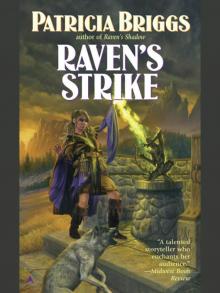 Raven s Strike
Raven s Strike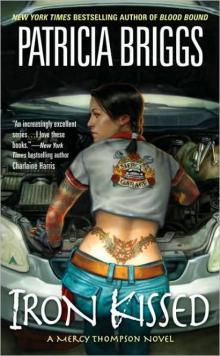 Mercedes Thompson 03: Iron Kissed
Mercedes Thompson 03: Iron Kissed Bone Crossed mt-4
Bone Crossed mt-4 Blood Bound mt-2
Blood Bound mt-2![[Mercy 01] - Moon Called Read online](http://i1.bookreadfree.com/i2/04/09/mercy_01_-_moon_called_preview.jpg) [Mercy 01] - Moon Called
[Mercy 01] - Moon Called River Marked mt-6
River Marked mt-6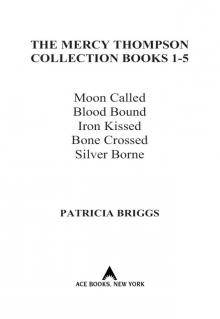 The Mercy Thompson Collection
The Mercy Thompson Collection Moon Called mt-1
Moon Called mt-1 Mercy Thompson 8: Night Broken
Mercy Thompson 8: Night Broken